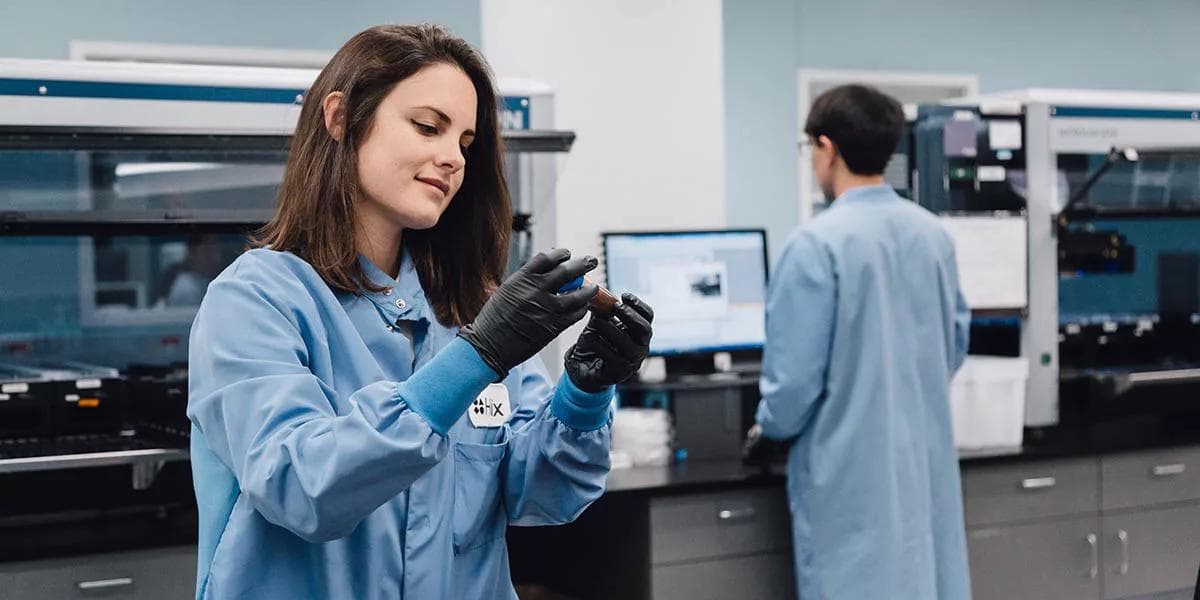What is Lynch syndrome?

In 2012, experts in public health and medicine met to discuss genetics as a public health topic. Working with the Centers for Disease Control (CDC), they decided that three genetic conditions should be called “Tier 1” conditions, meaning that they meet specific public health criteria concerning population prevalence, morbidity/mortality, and preventability. We’ve written about two of them before: the BRCA genes, and the genes associated with familial hypercholesterolemia. Today, we’re introducing the third one, Lynch syndrome.
Lynch syndrome is a hereditary predisposition to developing certain types of cancer, which means that a person is more likely to develop certain types of cancer than the general population. The odds vary depending on the organ in question. For instance, over the course of a person’s lifetime, an individual with Lynch syndrome has roughly a 52-82% chance of developing colon cancer. That same person’s odds of developing gastric cancer are approximately 6-13%1. Over the past 20 years, scientists have identified 5 primary genes for which certain variants cause Lynch syndrome: MLH1, MSH2, MSH6, PMS2, and EPCAM. It is passed down in the family as an “autosomal dominant” disorder, meaning that both men and women can have Lynch syndrome, can inherit it from their mother or father, and can pass it on to their sons or daughters. It also means that the odds of passing it on are always 50/50 for each individual offspring (with the exception of identical twins who would both inherit it or both not inherit it)1.
The many names of Lynch syndrome
Lynch syndrome is also sometimes known as Hereditary Non-polyposis Colon Cancer (HNPCC), Muir-Torre Syndrome, or Turcot Syndrome. HNPCC has gone out of style because people who have this condition sometimes have more polyps than the general population, so it’s inaccurate. Muir-Torre describes when someone has a history of specific skin findings. Turcot is similar, with the exception that it involves a cancer of the central nervous system, most commonly a glioblastoma.
Lynch syndrome is considered a “Tier 1” condition for several reasons. First, it’s relatively common. It’s estimated that 1-6% of people with colon cancer, and approximately 1% of women with endometrial cancer, have Lynch syndrome. All told, approximately 1 out of 440 people have the condition, affecting anywhere from 200,000-300,000 Americans. Second, once someone who has Lynch syndrome is identified, it’s possible to identify the other people in the family who also have it because it is a hereditary condition. This means that more individuals can get the screening, prevention, or treatment they need1.
Third, some types of cancer associated with Lynch syndrome—like pancreatic cancer—are not highly preventable at present. But most types are preventable to some degree. For instance, men and women who have Lynch syndrome are at increased risk for colon cancer, so medical guidelines recommend getting colonoscopies at a younger age and more regularly than the general population. Women who have Lynch syndrome have an increased risk of developing ovarian and/or endometrial cancer as well. Here, preventative surgery can lower their odds of developing these types of cancer relative to that of the general public, although it does not completely eliminate the possibility of cancer stemming from those tissues. And in the case of pancreatic cancer, individuals who test positive for Lynch syndrome can sometimes qualify for a clinical trial that is looking for new ways to screen and/or prevent pancreatic cancer. It’s been over 100 years since a doctor in Michigan noted that there may be a familial component to certain cancer types. In that time we’ve learned an astonishing amount about how to identify people who have Lynch syndrome and lower their cancer risk. Currently, there are various ways that an individual who has Lynch syndrome is identified, at which point their relatives can be offered testing. Methods include family history analysis, testing of tumor samples, and DNA testing. One significant downside of some of these techniques is that they are commonly used once a person has already been diagnosed with cancer. An ACMG 59 product, like the one that will be launched by PerkinElmer Genomics with Helix, is designed for healthy people who want to take proactive steps to stay healthy—and Lynch syndrome will be among the tested conditions.
1Kohlmann, Wendy. “Lynch Syndrome.” Advances in Pediatrics., U.S. National Library of Medicine, 12 Apr. 2018, www.ncbi.nlm.nih.gov/books/NBK1211/.